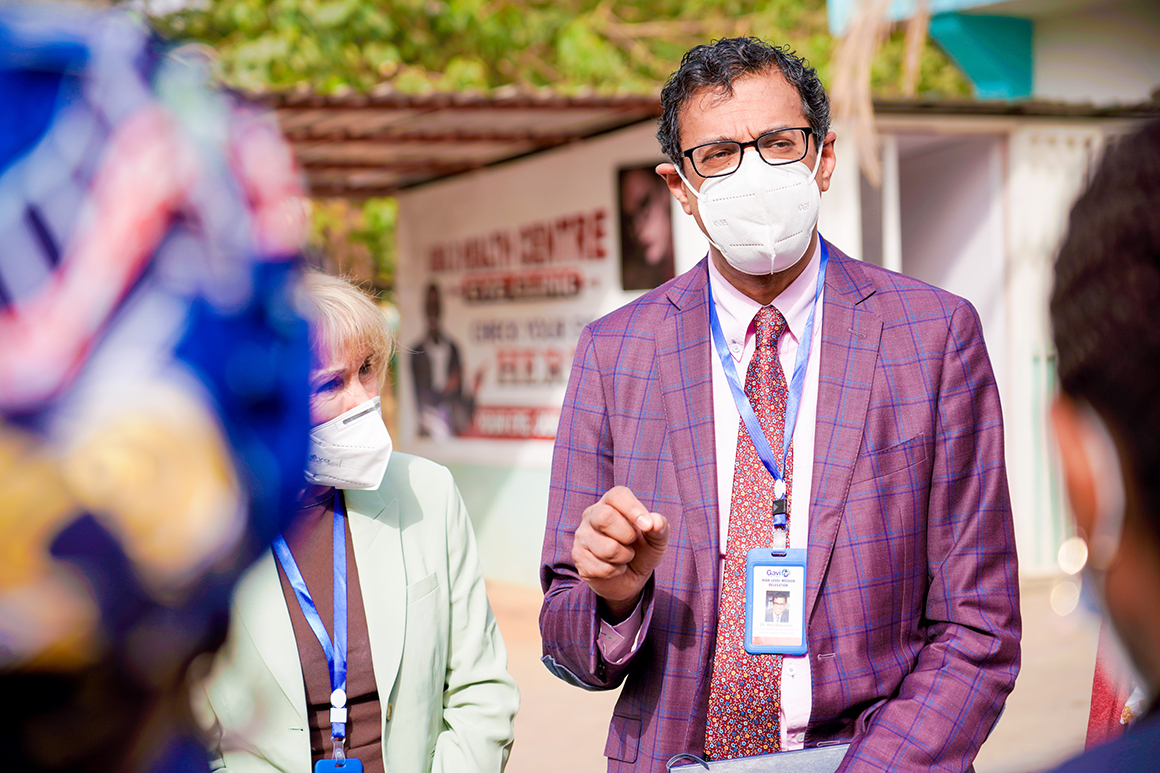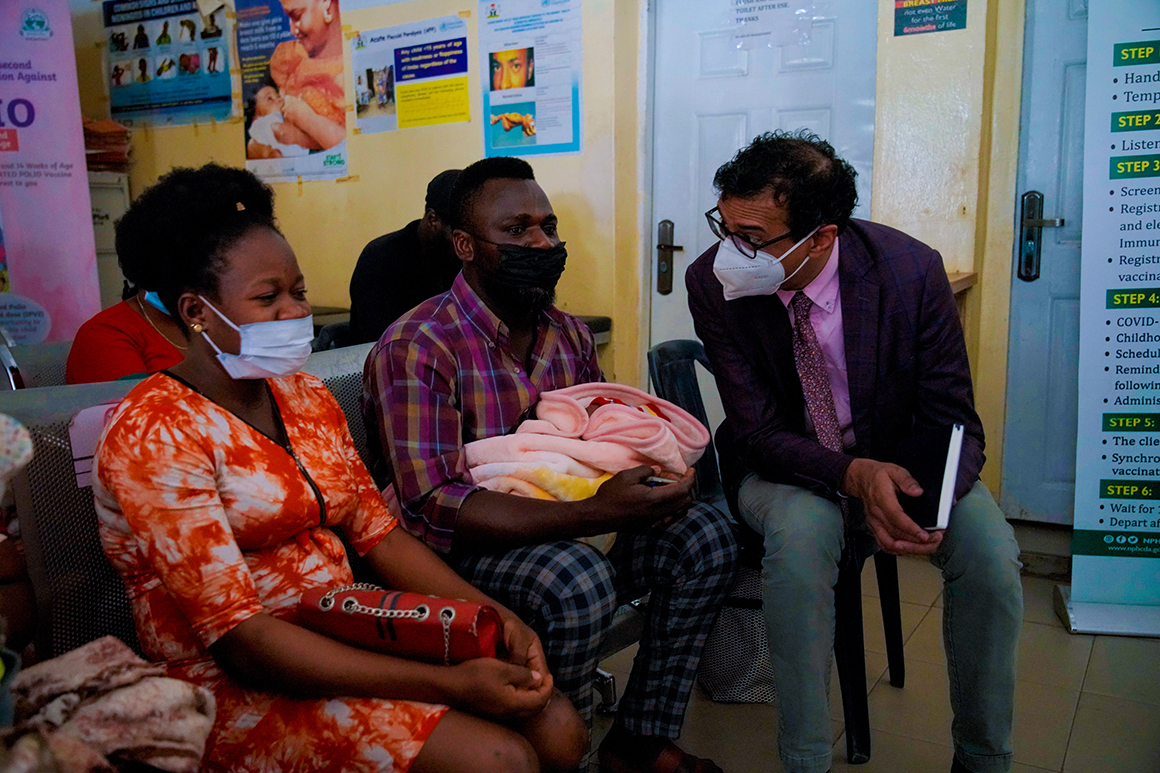
For nearly three months, top officials at the U.S. Agency for International Development privately warned the White House and lawmakers on Capitol Hill that USAID would soon run out of money to help put Covid-19 shots in arms across the world, jeopardizing one of President Joe Biden’s key Covid promises.
In 2021, Jeremy Konyndyk, the executive director of the agency’s Covid-19 task force, helped set up a system to deliver and help administer hundreds of millions of Covid-19 shots in dozens of countries — more than any other nation combined. But at the turn of the year, the billions of dollars the agency received through the American Rescue Plan was running low and USAID officials raced to the Hill to make the case for more money to continue their vaccination work.
With a more than $4 billion request stalled in Congress, USAID officials are now forced to plan for the possibility that their funding will run dry in the next few months, limiting their ability to vaccinate vulnerable populations in dozens of countries — a prospect that Konyndyk said could put Americans at risk.
“If we begin to see support for the global Covid effort grinding to a halt, it would make the U.S. domestic situation vulnerable,” Konyndyk said. “The biggest setbacks we’ve seen on the domestic front have come from the emergence of new variants [overseas].”
The lack of funding threatens to undermine Biden’s June 2021 pledge to help end the pandemic worldwide by providing an “arsenal” of vaccines. And it would limit USAID’s ability to fulfill its mission — to help save lives — at a time when millions of people are still unprotected and at risk of getting Covid.
“Getting first and foremost to those folks who are at highest risk of a severe outcome from the disease, particularly with the immunocompromised populations — those are the populations that are likely the highest risk of potentially producing new variants,” Konyndyk said. “The more that we can expedite coverage of those populations, the shorter the lifespan of their infections.”
Konyndyk said that 90 percent of the original American Rescue Plan funding Congress appropriated to the agency for emergency Covid-19 programs has either been spent or is in the process of being used. And, he said, the efforts supported by that money, including those that help countries get the shots from an airport runway to people in remote areas, will likely “shut down” in the second half of the year.
The prospect of USAID’s global vaccination campaign running out of funds is causing high levels of anxiety among some officials in the administration that the U.S. will not be able to live up to its promises not only to help poorer countries have access to life-saving shots and treatments but also to help countries distribute and administer them.
Failure to do so could further exacerbate the global health disparities that the Biden administration has often pledged to address. It also could risk the U.S.'s own health security, allowing the virus to circulate unchecked, increasing the chance of new mutations that could evade western vaccines.
Biden is expected to hold his second global vaccine summit in April and ask other countries to ramp up their vaccine and cash donations to help the effort — an event that could come before the White House and Congress reach a deal on supplemental funding.
The funding woes come at a time when many western and highly vaccinated countries including the U.S. are beginning to relax public health restrictions such as indoor mask mandates. The push to move out of the emergency phase of the pandemic has frustrated global health leaders who say the world is not safe from Covid-19 until more people receive their first vaccine dose — an undertaking they say should take priority over rolling out fourth shots to healthy individuals in wealthy nations.
“This virus is continuing to change and adapt. We're not out of the woods yet,” said Seth Berkley, CEO of Gavi, the global vaccine alliance leading the COVAX effort. “You turn the telly on and countries are just completely back to normal even though their cases are going up and hospitalizations, in many cases, are going up, and death rates are going up. We may be done with the virus, but I don't think it's done with us.”
Berkley said the 92 countries that are eligible to receive vaccine donations through COVAX have an overall vaccination rate of 40 percent. But low-income countries still have low vaccination rates — 14 percent of people have one dose, and 11 percent are fully vaccinated. Over the last several months, Gavi and COVAX have worked with 34 countries that as of January had less than 10 percent of their population vaccinated. Now, 19 of those countries have rates below 10 percent.
“[They are] the ones that have the biggest problems with their health systems. We've made some real progress there. But those countries will need very bespoke plans to work on it,” Berkley said. “What they need is an analysis that says what are the barriers, what can help, and sometimes it's going to be pure health care capabilities. It's going to be transport, it may be some cold chain or supply chain, or maybe some hesitancy. It's a range of different issues.”
Those are some of the problems USAID planned to address this year, in large part through its Global Vaccine Access program, or Global VAX. The program was set up to help bridge the vaccination gap by expanding Covid-19 assistance and increased access to vaccines worldwide, particularly in sub-Saharan Africa. USAID is investing $510 million in local health systems to help stand up mobile clinics and get proper freezer storage to help boost vaccination rates in 11 countries.
But, Konyndyk said that money will likely run out by the middle of the year, raising questions about how USAID will be able to continue helping those 11 countries and dozens of others in Africa, including Kenya, Malawi and Cameroon.
USAID asked Congress for $19 billion to help create Global Vax. But that number got whittled down after talks among the White House, Congress and the agency. Earlier this month, the White House officially asked Congress for more than $4 billion for USAID — 75 percent less than the original request. At the time, White House officials said the funding number was temporary and that the administration would find more money for the agency down the line.
That request, though, is on hold, and lawmakers don’t know when they expect to vote on the White House’s funding request, which also includes about $15 billion for domestic Covid-19 efforts. Meanwhile, congressional Republicans are pushing the administration to account for the Covid-19 emergency funding it has received as a condition to vote on any new funding request. White House officials said this week they have provided lawmakers with information about how the administration spent the money.

Over the last several months, global health leaders have begun fundraising to prepare for the next pandemic. On Capitol Hill, the Senate passed a bill that sets aside billions of dollars in funding to strengthen data systems and increase manufacturing of diagnostics, therapeutics and vaccines. The Coalition for Epidemic Preparedness Innovations, based in Norway, earlier this month held a donor drive to support its goal to help develop a vaccine for the next pandemic in 100 days.
USAID is pondering how to continue supporting the delivery of medical supplies, diagnostics and personal protective equipment this year given the likelihood that new variants will emerge. It’s reaching out to donors to help shore up the stockpiling effort.
“The goal was to make it a manageable respiratory illness. That means a series of things in Covid, and then a series of things beyond Covid,” said Atul Gawande, who leads global health development at USAID. “On Covid, that's not just getting the vaccine supplies, it's also getting the vaccines in arms, but then it goes beyond that. High-quality, mask production and rapid diagnostic test production needs to be maintained. The average time between surges so far has been four to five months.”
----------------------------------------
By: Erin Banco
Title: U.S. global Covid work will ‘grind to a halt’ without more cash
Sourced From: www.politico.com/news/2022/03/28/global-covid-vaccines-usaid-funding-00020627
Published Date: Mon, 28 Mar 2022 03:30:00 EST






